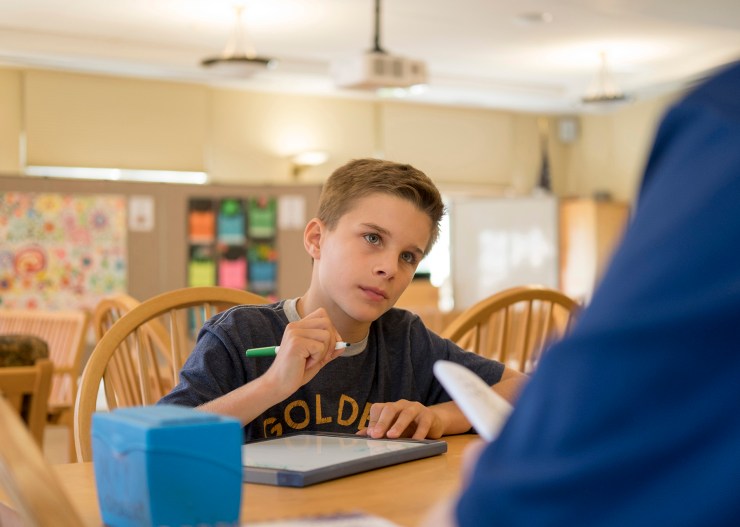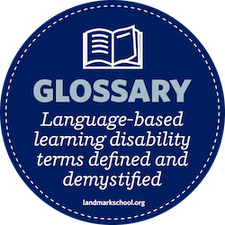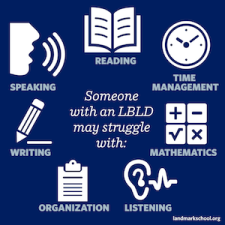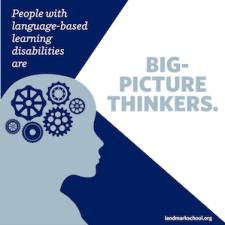- Our School
- Our Advantage
- Admission
- Elementary•Middle School
- High School
- Summer
- Giving
- Parent Resources
- For Educators
- Alumni
« Back
Language-Based Learning Disabilities (LBLD): A Primer
October 25th, 2017

This is part two of the five-part series, What Is a Language-Based Learning Disability?
Language-Based Learning Disabilities (LBLDs) refer to an array of difficulties related to the understanding or processing of both spoken and written language. The number and severity of language difficulties can vary widely from person to person. LBLDs can affect the following areas:
- reading
- listening (auditory processing)
- oral expression/word retrieval (expressive language)
- oral comprehension (receptive language)
- written expression (spelling, grammar, and mechanics)
- mathematics
When we talk about reading, we’re referring to three main areas: decoding (word attack/phonological awareness), reading fluency, and reading comprehension.
LBLD, Dyslexia, and Related Disabilities
An individual diagnosed with an LBLD often has the specific diagnosis of dyslexia. Dyslexia is a phonologically-based reading disability that results in difficulty decoding words accurately, which affects reading fluency and then reading comprehension.  Not all people diagnosed with an LBLD have dyslexia, although the majority will. It may be that their basic decoding and reading skills are intact; however, they may struggle with other areas of language processing and written or verbal expression. These difficulties may include:
Not all people diagnosed with an LBLD have dyslexia, although the majority will. It may be that their basic decoding and reading skills are intact; however, they may struggle with other areas of language processing and written or verbal expression. These difficulties may include:
- dysgraphia, a disorder that affects spelling, punctuation, and handwriting
- dyscalculia, a disorder that affects someone’s number sense, math reasoning, and ability to process math facts
- executive functioning, which limits one’s capacity to initiate and complete tasks, stay organized, manage time, and plan
- a language disorder (formerly called mixed receptive-expressive language disorder) that affects written and oral comprehension and expression
Attention deficit hyperactivity disorder (ADHD), central auditory processing disorder(CAPD), and anxiety disorders are often seen as comorbid, or commonly occurring diagnoses for people with LBLDs.
Understanding the Cognitive Profile
 An extremely important piece in defining and diagnosing an LBLD includes looking carefully at the individual’s cognitive profile. A person with an LBLD is going to have difficulties in reading, writing, listening, and speaking, despite having average to above-average cognitive ability, specifically in the areas of verbal comprehension, visual-spatial abilities, and fluid reasoning or problem solving. Although the LBLD individual may have somewhat lower working memory and/or processing speed, they have an overall strong ability for reasoning, problem solving, and “big-picture thinking.” They are bright, visual, and hands-on kinesthetic learners who tend to struggle more auditorily (listening).
An extremely important piece in defining and diagnosing an LBLD includes looking carefully at the individual’s cognitive profile. A person with an LBLD is going to have difficulties in reading, writing, listening, and speaking, despite having average to above-average cognitive ability, specifically in the areas of verbal comprehension, visual-spatial abilities, and fluid reasoning or problem solving. Although the LBLD individual may have somewhat lower working memory and/or processing speed, they have an overall strong ability for reasoning, problem solving, and “big-picture thinking.” They are bright, visual, and hands-on kinesthetic learners who tend to struggle more auditorily (listening).
Next Steps
If you feel that your child/student is struggling at school and suspect that they may have an LBLD, the first step to take is to have either psycho-educational testing (done through the public school system) or neuropsychological testing (done privately). Testing will provide information regarding current levels of cognitive, academic, and language functioning. This will also help with making recommendations regarding possible next steps to take and services that may be needed. Most importantly, continue to encourage your child/student, understand they are struggling, and remember that support is available for all types of learners.
About the Author
 Melody O’Neil is Associate Director of Admission at Landmark School
Melody O’Neil is Associate Director of Admission at Landmark School
What Is a Language-Based Learning Disability? Five Part Series
This is part two of the five-part series, WhatIs a Language-Based Learning Disability?
Part One:What We Know About LBLD and Learning, by Bob Broudo
Part Two:Language-Based Learning Disabilities: A Primer, by Melody O'Neil
Part Three: Help Your Struggling Learner: Remediation Is a Key to Success, by Christine Ozahowski
Part Four:It's a Myth That Young Children Cannot Be Screened for Dyslexia, by Nadine Gaab, PhD
Part Five: Language-Based Learning Disabilities on the Homefront, by Angela Timpone Gowans
![]() Landmark360.org's post by Bob Broudo about LBLD and Learning won a 2017 Gold InspirED School Marketers Brilliance Award in the national competition that recognizes excellence in private and independent school marketing and communications.
Landmark360.org's post by Bob Broudo about LBLD and Learning won a 2017 Gold InspirED School Marketers Brilliance Award in the national competition that recognizes excellence in private and independent school marketing and communications.
Posted in the category Learning Disabilities.






















